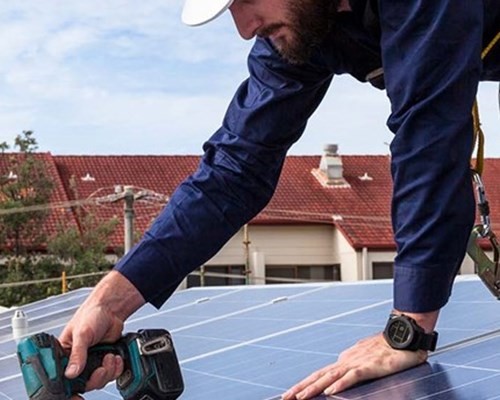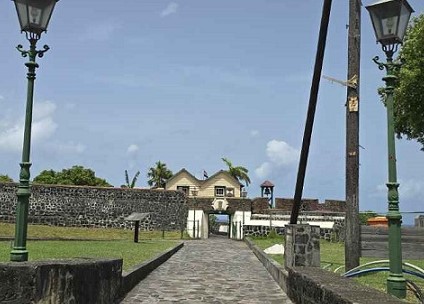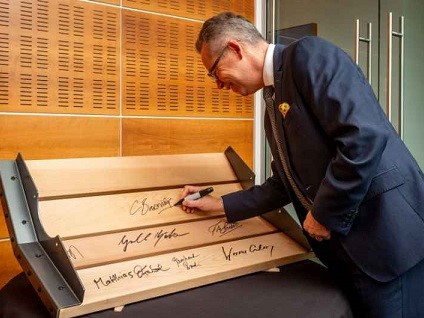A pioneering plan by the West Midlands Combined Authority (WMCA) to decarbonise entire neighbourhoods has been chosen for a new Government-backed programme aimed at speeding up the UK’s transition to net zero by attracting more private sector investment. As part of Innovate UK's Pioneer Places programme, the WMCA will work with its partners Bankers Without Boundaries and Dark Matter Labs to model the health and wellbeing, social and environmental benefits of its first Net Zero Neighbourhood in Dudley.
The model will help demonstrate the social value and environmental returns private funders have a growing appetite for as part of Environment, Social and Governance (ESG) strategies, as well as benefits other public sector partners will get from more people living in low carbon communities. Alongside that it will also show how the large-scale retrofitting of homes to make them more energy efficient can reduce costs and increase efficiency gains to a level that will prove attractive to private funders who are seeking a commercial return-on-investment.
The WMCA drew up its region-wide plan for a series of Net Zero Neighbourhoods in 2021 after acknowledging that decarbonising homes and making other community-wide improvements to the environment alongside transport infrastructure will be key to the West Midlands hitting its #WM2041 target and become a net zero region within the next two decades. Net zero schemes currently rely on limited and specific Government grants. It is hoped the WMCA’s funding model can incentivise a sustained stream of private finance to help roll out the Net Zero Neighbourhood concept across the West Midlands and then replicate it across the rest of the UK.
Andy Street, Mayor of the West Midlands and WMCA Chair, said: “It’s great news that our Net Zero Neighbourhood programme has been recognised as having the potential to play a key role in the transition to net zero – right here in our region but also as an exemplar for the entire country.
“The investment made by the WMCA was crucial in getting the Net Zero Neighbourhood programme moving but we can’t do it all alone. Whether it’s improving the energy efficiency of our homes, enhancing our health and wellbeing, or pursuing green growth, this project will help us to make the case for further funding – drawing in public sector partners and private investors as we honour our #WM2041 net zero commitment.”
The WMCA has already committed £1.6million to deliver the first Net Zero Neighbourhood in Brockmoor, Dudley - the first of its kind in the UK. Initially 50 homes will be made more energy efficient to reduce householders’ energy usage, carbon emissions, and bills, with wider improvements to the neighbourhood such as new green spaces and transport links.
The second phase, subject to funding being secured, aims to widen it out to up to 300 homes in the area to undergo ‘deep retrofit’ using cutting-edge insulation with options for solar panels and low carbon heating systems. Other measures include LED street lighting, on-street electric vehicle charging points, pocket parks, playgrounds, communal food growing initiatives, green roofs and sustainable drainage systems.
The WMCA wants to create another six Net Zero Neighbourhoods across the region. Funding has also been secured for retrofit schemes in Elmdon in Solihull, and Foleshill in Coventry thanks to £2.86 million from the Government’s Sustainable Warmth Competition.
A further £7.5 million has been secured from the Social Housing Decarbonisation Fund as part of a consortium including Sandwell Council, Solihull Community Housing, City of Wolverhampton Council, Community Housing Group, Midland Heart, Orbit Housing Group, and Wrekin Housing Group, to retrofit 600 social homes.
Councillor Ian Courts, WMCA portfolio holder for environment and energy, and leader of Solihull Council, said: “Being recognised and chosen to be part of the Pioneer Places programme has unlocked a fantastic opportunity to encourage further investment in low carbon neighbourhoods across the region.
“The WMCA has consistently championed the social and economic benefits of transitioning to a net zero society. Amidst the current cost of living challenge, widening access to measures which are both cost-saving and emission reducing is vital for the region now and to secure its long-term future.
“With the target of being a net zero region by 2041, time is of the essence when developing a systematic evidence-based strategy for investment in net zero technologies. Modelling the wide-ranging benefits from the region’s Net Zero Neighbourhoods programme will enable us to apply these innovative solutions at scale.”
Global head of retrofit and built environment at Bankers Without Boundaries, Rufus Grantham, said: “We are really excited to work with the WMCA and the Energy Capital team on such an impactful project to unlock a key part of the net zero transition but also with potential to deliver significant social value across the West Midlands and beyond.”
Dan Hill, at Dark Matter Labs, added: “We know that better homes and neighbourhoods are linked with better health, financial resilience, lower costs for governments and better outcomes for society as a whole. We are looking forward to working with local stakeholders to better understand these connections and find ways of increasing the investment to make homes the safe and comfortable places we need.”
The WMCA and its partners have been awarded £75,000 for Project CAMPOS (Creating A Market for Place-based Outcomes) from the Pioneer Place programme, established by Innovate UK, part of UK Research and Innovation.











